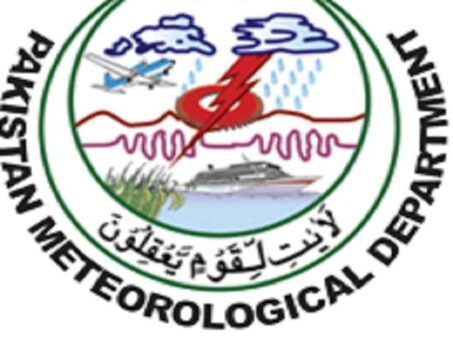Islamabad, May 21, 2024 (Pkrevenue.com) — Director General Mahr Sahibzad Khan of the Pakistan Meteorological Department (PMD) attributed the ongoing extreme weather conditions in the country to climate change.
In a press conference on Tuesday, Sahibzad Khan, alongside senior PMD officials, discussed the factors contributing to the current heatwave affecting Pakistan.
“The current heat wave in Pakistan stems from a combination of meteorological, climatological, and environmental factors,” Khan stated. High-pressure systems, clear skies, and limited cloud cover have trapped heat near the Earth’s surface, creating ideal conditions for soaring temperatures.
Khan emphasized that climate change plays a significant role in increasing the frequency and intensity of heatwaves worldwide, including in Pakistan. “Rising global temperatures, due to greenhouse gas emissions and other human activities, contribute to the overall warming of the planet, resulting in frequent extreme heat events,” he explained.
Rapid urbanization in major cities like Islamabad, Lahore, and Karachi exacerbates the situation by causing higher temperatures. “Climate change mitigation, urban planning strategies, and adaptation measures are essential for reducing the severity of heatwaves and protecting the population from their adverse effects,” Khan suggested.
Addressing concerns about the heatwave’s impact on water supply and power generation, Khan reassured that the country has sufficient water in reservoirs due to heavy rains in recent months. Regarding the intensity of the upcoming monsoon rains, he noted that the PMD is closely monitoring weather patterns, which indicate more rainfall, though the situation requires further analysis.
The government has actively monitored the heatwave situation and initiated measures to mitigate its impact. These measures include issuing advisories and warnings to the public through media, setting up cooling centers in urban areas, and ensuring adequate supplies of electricity and water. “The PMD has already shared the heatwave alert with health authorities, who are now vigilant and taking necessary measures,” Khan added.
The PMD has advised citizens to stay hydrated, drink plenty of water, use fans, take cool baths to lower body temperature, and avoid spicy food and hot beverages. “Citizens must wear lightweight and loose-fitting clothing and limit their outdoor activities during this period. They must not leave children or pets in vehicles,” Khan emphasized.
From May 21-23, Sindh and Punjab will experience a day temperature increase of 4-6 degrees Celsius above normal. From May 23-27, temperatures will rise 6-8 degrees Celsius above normal. Islamabad will see a temperature rise of 5-7 degrees Celsius above normal, while Khyber Pakhtunkhwa, Balochistan, Gilgit-Baltistan, and Kashmir will experience a rise of 4-6 degrees Celsius above normal.
Regions most affected by the heatwave include Thal, Sahiwal, Okara, Bhakkar, Bahawalnagar, Bahawalpur, Kot Addu, Rahim Yar Khan, Sibbi, Larkana, Sukkur, Dadu, Jacobabad, and Shaheed Benazirabad. Urban areas will also bear the brunt of the heatwave.
Sahibzad Khan’s statements underscore the urgent need for comprehensive climate action to address the root causes of extreme weather events. The PMD continues to monitor the situation and provide timely updates to ensure public safety and preparedness.
